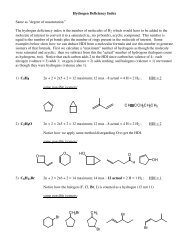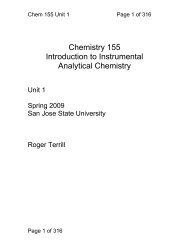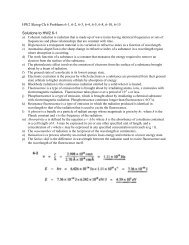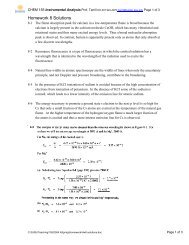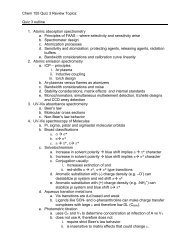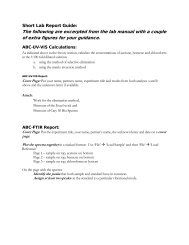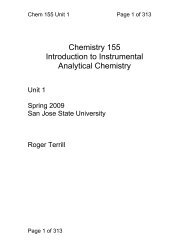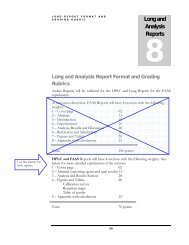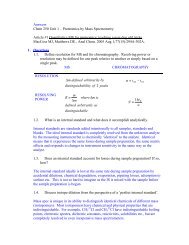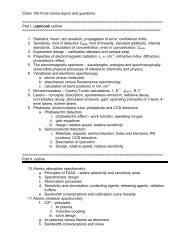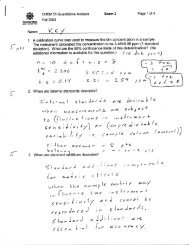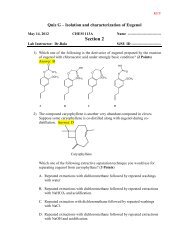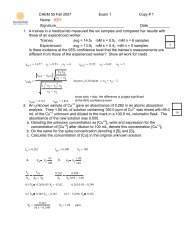Justice Studies - Department of Chemistry - San Jose State University
Justice Studies - Department of Chemistry - San Jose State University
Justice Studies - Department of Chemistry - San Jose State University
You also want an ePaper? Increase the reach of your titles
YUMPU automatically turns print PDFs into web optimized ePapers that Google loves.
Since the previous review, the faculty also changed the requirements regarding undergraduateclasses taken for graduate credit. The number <strong>of</strong> units <strong>of</strong> undergraduate work allowed forgraduate credit has been reduced from 9 (3 classes) to 6 (2 classes), and these courses only countfor graduate credit if the instructor assigns additional graduate-level work apart from the regularcourse requirements imposed on undergraduates. (Graduate students may also take two graduatecourses in other departments at SJSU, with the approval <strong>of</strong> the graduate advisor.) As indicated inthe Fall 2000 self-study, the decision to allow graduate students to enroll in select undergraduatecourses was made at a time when the department lacked sufficient full-time tenured and tenuretrackfaculty to cover both the undergraduate and graduate programs fully; because <strong>of</strong> the largedemand in the undergraduate program, covering core required undergraduate courses with fulltimefaculty resources was given priority over the graduate program. Although undergraduatestudent demand has increased since that time and additional tenure-track hires are needed, thegraduate faculty recently decided to eliminate the option for graduate students to enroll inundergraduate courses, and instead to require that all 30 units <strong>of</strong> the MS program be completedin 200-level courses, with a minimum <strong>of</strong> 80% (8 courses or 24 units) completed in JS.A few additional changes to the graduate curriculum are pending. In order to ensure thatsufficient graduate courses are <strong>of</strong>fered every semester, to establish a regular graduate coursesequencing that will enable students to plan effectively and the department to schedule courseseffectively, the department is in the process <strong>of</strong> changing the graduate course sequence and isconsidering adding one or two new graduate courses to the curriculum. The graduate faculty isalso in the process <strong>of</strong> reviewing the undergraduate prerequisites to ensure that they are adequateand relevant to graduate study. The title <strong>of</strong> JS 270 will be changed from “Criminal <strong>Justice</strong>Practicum” to “Practicum in <strong>Justice</strong>” to reflect the broadening <strong>of</strong> the curriculum.c. Standard curricula: There is no standard JS curriculum as this is not an accredited programor pr<strong>of</strong>essional degree. It is more analogous to a social science degree where specificcompetency courses are required (e.g., introduction, theory, methods, an advanced or capstonecourse) and the remainder <strong>of</strong> the course work is through major freely selected and/or directedelectives in areas <strong>of</strong> interest. In that sense, our program is similar to other <strong>Justice</strong> <strong>Studies</strong> andrelated curricula.d. Curricular bottlenecks: The only major curricular bottleneck in JS is JS 100W, particularlygetting students to take the WST test as soon as they are eligible after completing English 1Aand 1B and/or upon transferring to the university. This bottleneck has been reduced somethrough advising; both in TIP advising sessions with transfer students and in individual facultyadvising, advisors emphasize the importance <strong>of</strong> taking the WST as soon as possible.e. Interdisciplinarity <strong>of</strong> <strong>Justice</strong> <strong>Studies</strong>: As noted throughout, <strong>Justice</strong> <strong>Studies</strong> is both multiandinter-disciplinary. JS faculty possess doctoral degrees in Biology, Community & HumanResources, Jurisprudence and Social Policy, <strong>Justice</strong> & Social Inquiry, Latin American History,Linguistics, Political Science, Psychology, and Sociology and conduct research and publish in aneven wider array <strong>of</strong> fields. Faculty bring their multi-disciplinary perspectives to the classroom;many individual courses are interdisciplinary by design, and even those courses primarilyinformed by a single discipline contribute to an interdisciplinary curriculum when the curriculum10




